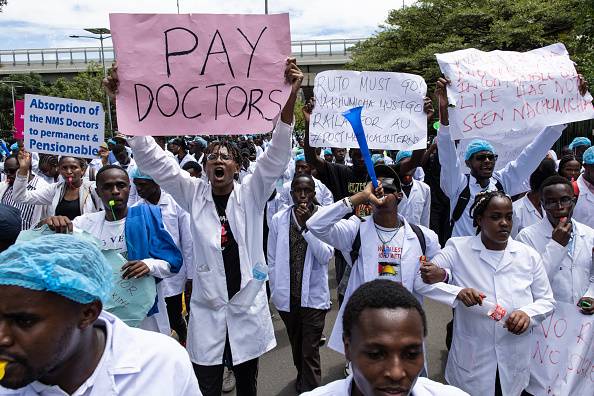
Kenyan doctors chant as they march towards the health ministry headquarters to demand better pay and working conditions in the capital, Nairobi on April 9, 2024. (Photo by SIMON MAINA/AFP via Getty Images)
Faced with sky-high inflation, low salaries and an overstretched healthcare system, doctors and nurses are leaving Nigeria in their thousands every year for better opportunities abroad.
Between 15 000 and 16 000 doctors have departed in the past five years, according to Nigeria’s health minister, Muhammad Ali Pate. The country has just 55 000 doctors for a population of 220 million, he said.
The exodus of healthcare workers has heaped extra strain on those who stay, and made choices tough for students thinking about their future.
On his way to the Lagos State University College of Medicine, second-year medical student Hassan Adewunmi said he was reluctantly prepared to find work elsewhere after graduating.
“The elites prefer to seek treatment abroad rather than in Nigeria, and that says a lot about the state of hospitals in the country,” Adewunmi said.
“And we ask why doctors and nurses don’t want to stay.”
Doctors in Nigeria’s public and in some private hospitals make $2 000 to $4 000 each year, so they earn an average of about $200 a month, said Moses Onwubuya, president of the Nigerian Medical Students’ Association.
Most healthcare workers are based in the major cities. There are about 7 600 doctors in Lagos, the country’s most populous city, and 4 700 in the capital Abuja, according to the health minister. In the rest of Nigeria, there are about two doctors for every 10 000 people.
“Our facilities in the country are below standard and short-staffed, resulting in massive burnout,” said Dele Abdullahi, president of the Nigerian Association of Resident Doctors and a general practitioner at the University of Ilorin Teaching Hospital in southwest Nigeria.
In 2020, the World Health Organisation placed Nigeria on its red list of states facing a serious shortage of doctors and nurses.
Healthcare workers are “heading mainly for the United Kingdom, Canada and the United States, but also increasingly to Middle Eastern countries like Saudi Arabia. They are also going to Scandinavia,” Onwubuya said.
Almost 5 000 doctors moved to Britain between 2015 and 2021, according to a Nigerian non-profit, the Development Research and Projects Centre.
In a bid to limit the brain drain, MP Ganiyu Johnson proposed a bill in 2023 that would require medical graduates to work for five years in Nigeria before obtaining a full licence to practise. Parliament has not yet passed the bill, which was heavily criticised by doctors’ associations.
The law for nurses changed on 1 March, requiring them to practise for at least two years in Nigeria before they can leave the country.
“We need to increase salaries, buy equipment, renovate hospitals and set up scholarships for students. That’s what the government should be doing, not this type of law,” said Stella Naomi Oluwadare, a private dental nurse who said that even with 10 years of experience, she earns about $200 a month.
She is preparing to join her husband, an orthodontist, who emigrated to Canada in 2022.
Chomas Abiodun, a nurse at a private hospital in Lagos, said she feared that future generations of students would suffer.
“If all qualified professionals leave the country, who’s going to teach in schools and supervise young people during their hospital internships?” she said.
“Something has to change.”
In March, the health minister said he would look into increasing health professionals’ salaries, but there is no sign yet that Nigeria has managed to stop the mass departures.
Meanwhile, in Kenya, hundreds of hospital doctors joined a demonstration in the streets of the capital Nairobi on Tuesday as a nationwide strike by medics neared its fourth week.
About a dozen riot police in pickup trucks were out to monitor the protest, which was not authorised by the authorities.
Members of the 7 000-strong Kenya Medical Practitioners, Pharmacists and Dentists Union (KMPDU) have been on strike since 13 March to demand better pay and working conditions, disrupting healthcare at the country’s 57 public hospitals.
Wearing white lab coats, the doctors chanted “solidarity forever” as they marched to the health ministry, where they blocked the entrance gates.
“We are more than willing to go back to the hospitals but the effort being put by the government is not enough to end the human suffering,” the KMPDU’s deputy secretary general, Dennis Miskellah.
The union last week rejected an offer by the government that included paying arrears under a 2017 collective bargaining agreement, and hiring trainee doctors on permanent contracts.
In March, a labour court had ordered the union to suspend the strike and last week it set a 14-day deadline for the completion of negotiations to end the stalemate.
Kenya’s President William Ruto, who has embarked on a programme of cost-cutting measures since taking office in 2022, on Sunday ruled out any further concessions.
“We cannot continue to spend the money we do not have,” he said.
“I am telling our friends the doctors that … we value the service they give to our nation but we must live within our means.”
Poor salaries and working conditions have led to an exodus of Kenyan medics to other African countries and further afield.
In 2017, Kenyan doctors staged a crippling 100-day nationwide strike that left public hospitals shut and patients unable to get basic medical care.
Dozens of patients died from a lack of treatment during the walkout, which ended after a collective bargaining agreement was reached.
But doctors have accused the government of reneging on some parts of the deal, leading to the current strike.
— AFP
